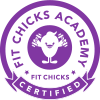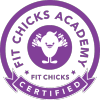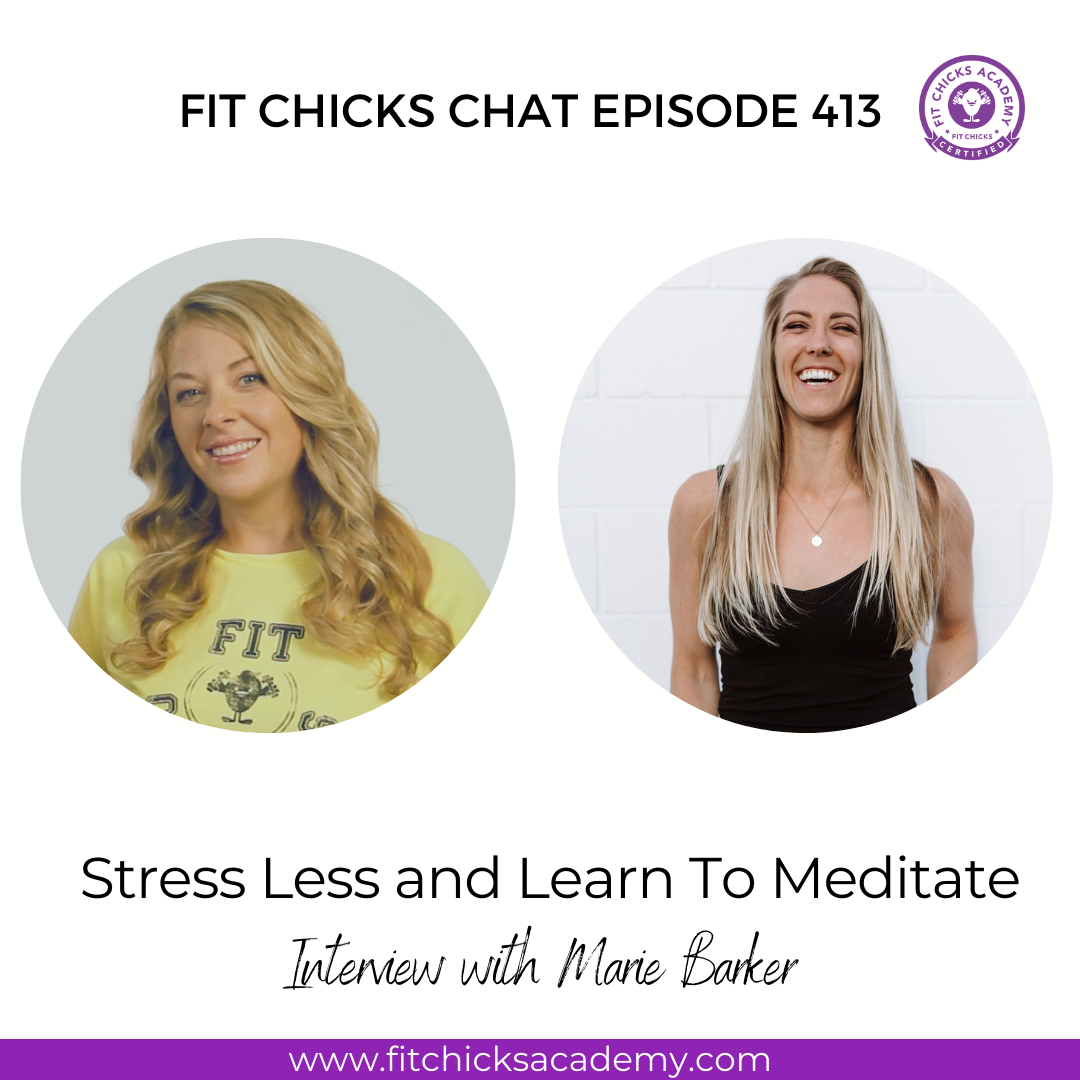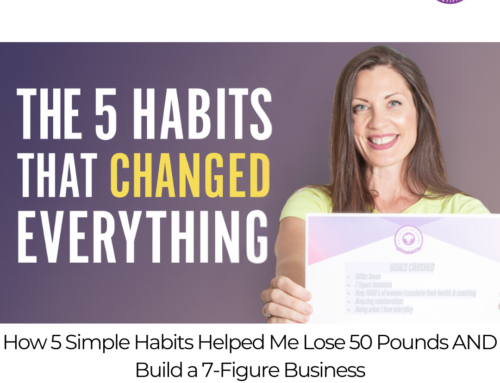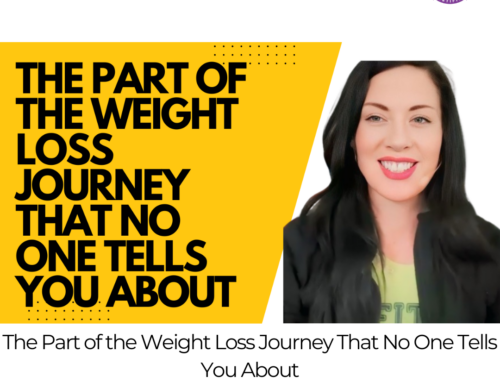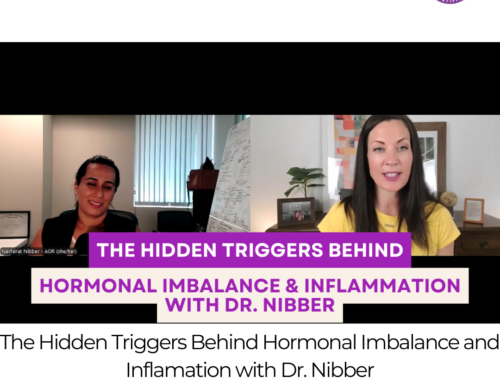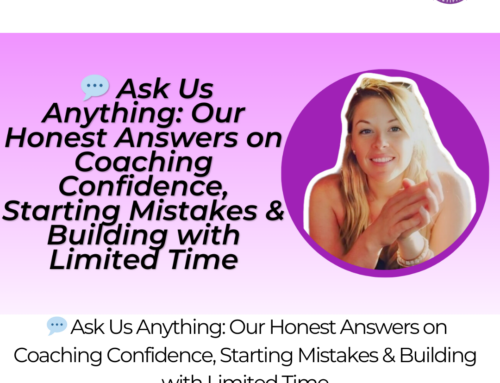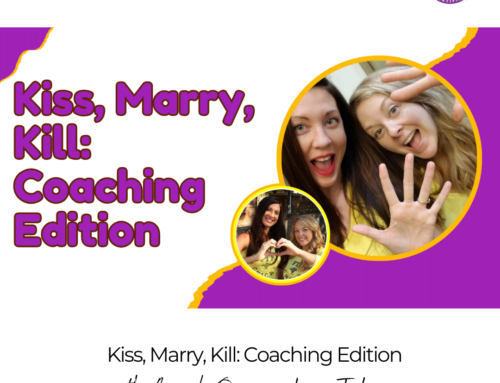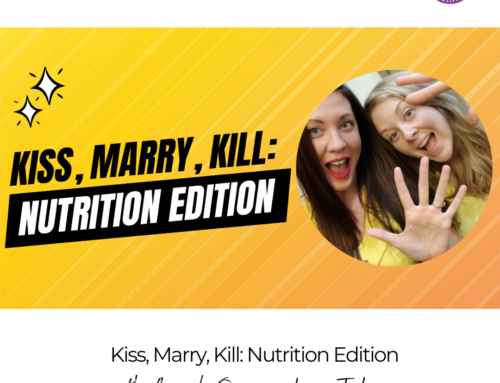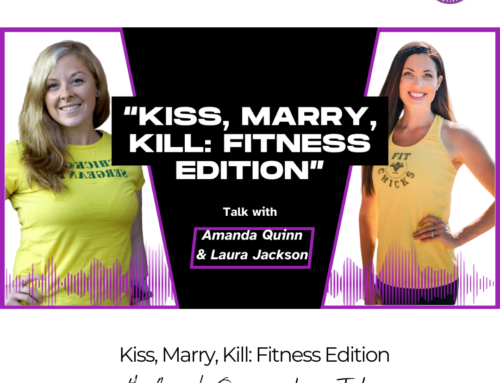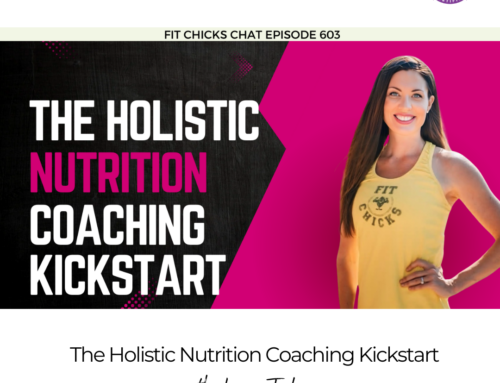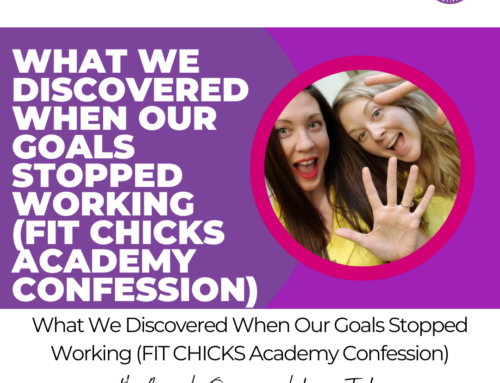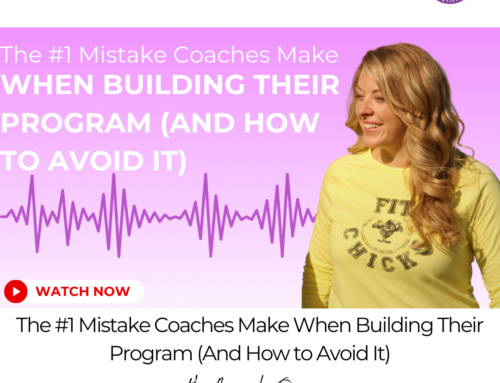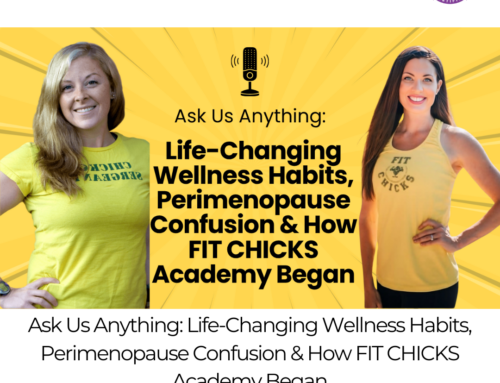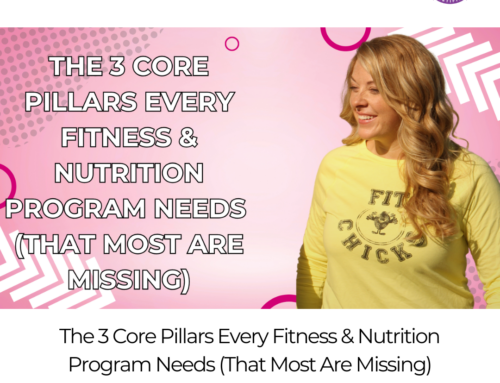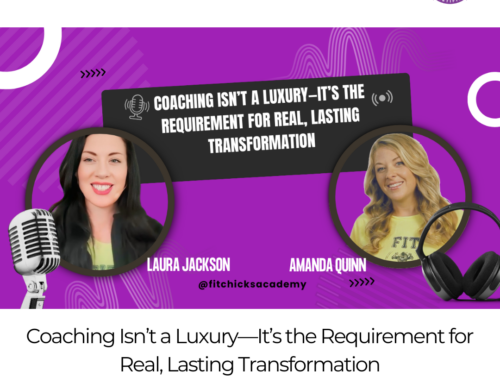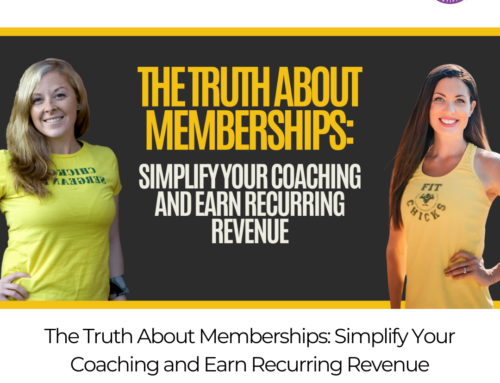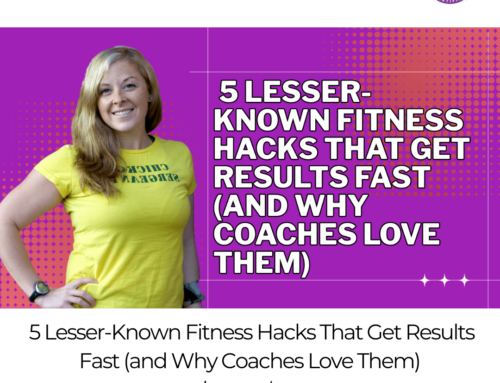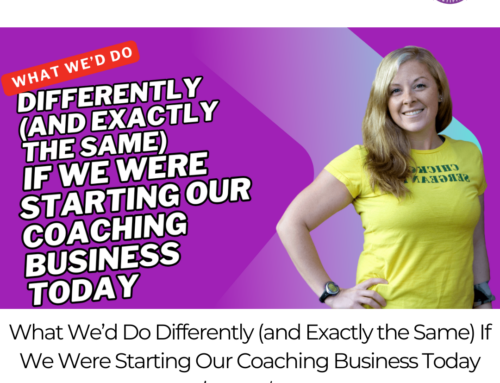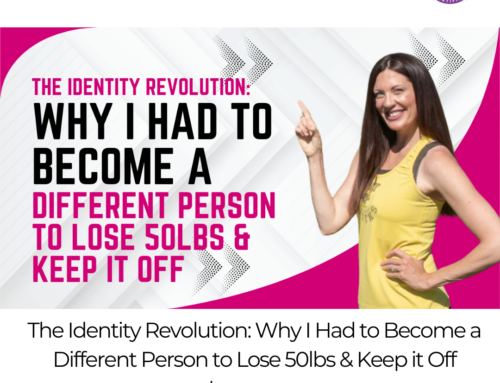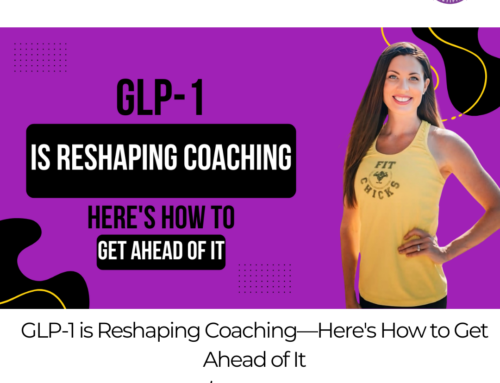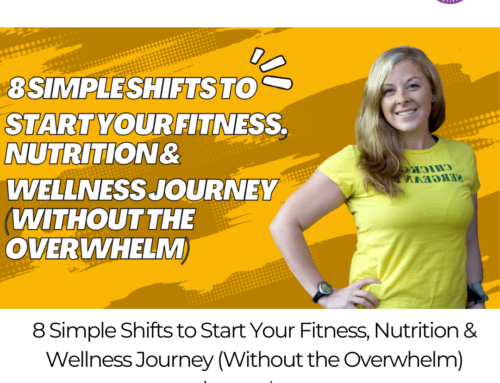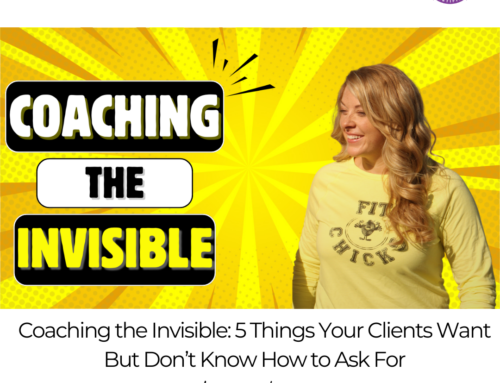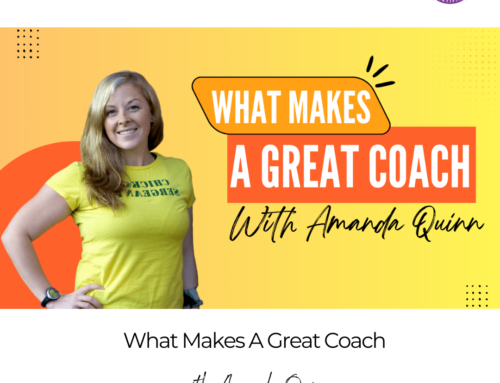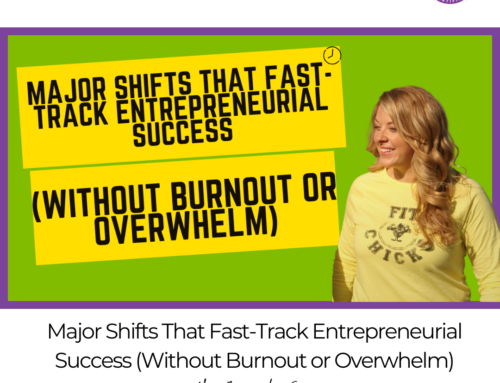The holidays can bring up a lot of emotions for many including the overall feeling of stress and overwhelm!
Today Marie Barker joins us to chat through how we can all learn to adopt a meditation practice that allows us to breathe a little deeper, let go a little more and release the everyday stress from our bodies and minds. With even just a minute a day you can begin to see small changes that will compound into bigger changes in your life.
This conversation is for anyone who is just starting out, considering meditation or who has been using meditation as a tool already to learn some new techniques to stress less now:)
Do you love health and fitness and are ready to make an impact and income? Our FIT CHICKS Academy Fitness & Nutrition Expert Coaching Certification opens for enrollment this week so join us on Thursday at 12pm for our live info session to learn how to get certified and start build an incredible fitness business of your dreams at www.fitchicksacademy.com/infosession
CLICK ON THE PLAYER BELOW TO LISTEN TO THE FULL EPISODE
Bio
Marie Barker is a high vibe women’s wellness coach, with a passion and specialty in meditation, mindset and holistic living. A former High School English Teacher, with a past of autoimmune issues, anxiety and depression, she has done the work to heal and shares her journey openly and authentically.
Marie transitioned to full time online coaching in 2017 and is the creator of the BWELL CLUB, a virtual wellness community for women committed to greater wellbeing through simple daily habits. Their motto? It’s good to feel good.
She is a certified meditation teacher, the host of the Live On Purpose Podcast, and the Creator of two online programs, “Know Your Flow” and “Stress Less + Learn To Meditate”. She can be found spreading joy, real-life wellness tips and having daily dance parties on her Instagram stories @mariebarkerwellness.
You can learn more about Marie at www.mariebarkerwellness.com or follow her on social media => www.instagram.com/mariebarkerwellness and www.facebook.com/mariebarker11
Marie is hosting an end-of-year wellness challenge for women committed to finishing 2021 feeling GOOD. The challenge will be held in a private group chat and entails access to guided meditations, hundreds of workouts (both live classes and recorded), top nutrition programming, meal guides, journal prompts, a private app tracker and much more. Want to end 2021 feeling better – inside and out? Join here => https://marie-barker-wellness.mykajabi.com/stress-less-class-12-15-21
Video Transcript
Amanda Quinn (00:02):
Hello everyone. And welcome to fit chicks chat. My name is Amanda Quinn and on today’s podcast, we have Marie Barker joining me today. Hi Marie.
Marie Barker (00:09):
I’m so excited to be here.
Amanda Quinn (00:12):
Always love our conversations. I know we were just offline chatting forever. And then I was like, Hey, we should probably record because this is great content that we’re talking about even right now. So for everyone listening, Marie is joining me today because we are going to be talking specifically about meditation and how to get started in being mindful and using meditation as a tool to be able to just add to your life, you know, that’s really what it’s about in my mind. I think meditation for me is really a tool that just adds so much value to my life. Would you agree with that?
Marie Barker (00:41):
A hundred percent? Yeah.
Amanda Quinn (00:45):
No. Before we get into some of the sort of tactical steps of like even how to get started, I would love for you to be able to share, because I’ve known you now for a few years and you know, I know that your story really started with you as a beach body coach. And I knew you were still a Beachbody coach, but I’m curious to know if you can share your story about how it’s kind of evolved into becoming a meditation coach and now speaker, and sort of why that became a significant sort of path for you.
Marie Barker (01:12):
Absolutely. first of all, I have to bring up the fact that your podcast, we had a conversation, I think it was 2016 and it was the first podcast I had ever been interviewed on. So this is so special to all circle years later, you know, be back having a conversation with you and specifically having a conversation about something that I am so bloody passionate about that I practice that I teach that I preach that I just embody because it has significantly what changed my life really, truly. So I became a teacher in 2015. This is important because I was stressed beyond measure already. And I went into a profession where, you know, there’s not a lot of support for the person who is holding a lot of space for the people that they are caring for. I’ll say it like that. And as somebody who is an empath is somebody who is a giver. I found myself burnt out from giving and I was not filling my cup properly. And you know, it got so bad during that time that I ended up having these heart palpitations all the time. And I was experiencing adrenal fatigue at a young age, like we’re talking like 23, 24. I ended up going to my doctor because of these heart, heart palpitations. And she put me on the ECG scanner and, you know, she was really concerned. She said, well, let’s just make sure that you’re not having a heart attack. And I was like,
Is that a possibility? Is that what this feels like? Cause it feels awful. You know, I just, I knew that something had to change. And I just remember, so specifically my GP looked at me and she said, Marie, you have one body. You have to take care of it. And I just coming from her, you know, somebody who knows how to write prescriptions and she’s phenomenal at her job, but generally speaking, you know, we have Western medical, we write prescriptions and it’s more of like a bit of a band-aid approach. It just, it really resonated with me the way she said it. She just genuinely saw me as a young person, struggling with anxiety, which I would later be diagnosed with. And I knew that I had to do something about it. I knew that you know, I needed something I had heard about meditation. I kind of had dismissed it at that point thinking, you know, like really how can sitting and breathing help me.
Marie Barker (03:41):
I can’t even close my eyes without feeling panicky and taking myself into a full, you know, tailspin, panic attack. And I just remember going home from the doctor’s appointment and I thought, okay, you know, there’s an app, you know, that I could download, I could download Headspace or whatever. And I could sit for two minutes, probably I could give myself two minutes. And so I gave myself two minutes and if I’m being honest with you, it was painful. And as soon as I closed my eyes, I felt that same constriction and tightness in my chest. And I felt panicked and I was sweaty and everything started coming up and out. And you know, all of these emotions and things that we repressed for years will start to come out when we give them time and space to do so. And when we allow ourselves to just sit and breathe and be with ourselves, but we don’t allow ourselves to just sit and be and breathe with ourselves.
Marie Barker (04:37):
You know, we’re so busy coping and reaching for external stimulus, whether it’s overwork or distraction, oh my God. We’re so addicted to our phones, to food, to enter any coping mechanism here. And so it can be really uncomfortable. And I experienced that. It was really uncomfortable for me, but I also recognized if nothing changes, nothing changes. And I knew that this was kind of my breaking straw. I knew that I needed to do something. And so I started with two minutes. I sat with two, the next day I sat with two, you know, I started moving on to three minutes and then five minutes and then eight minutes for a while. And, and then, you know, I was building this habit of, okay, at the very least every day I’m showing up for at least two minutes. That was my benchmark. And if I make it longer than that, beautiful.
Marie Barker (05:28):
And eventually I got to a place where I was sitting and meditating for 18 minutes a day for quite a while. That was a comfort spot for me. I, I felt like 20 was a lot, but 18, somehow it was better. And you know, all, all of this was going on this practice of, of daily meditation and adding this as a practice. This was all going on as I was a brand new teacher, as I was starting my wellness coaching business with each body, as I was, you know, in this nutrient Satori period of my life, stepping into who am I, what do I want? Do you know, really starting my career. And, and it is so significant to me because in the two minutes and in the five minutes and in the eight minutes, like there would be days when you’re sitting there and you know, you’re like nothing’s happening or there’s other days where you’re sitting there and, and I start weeping because I’m you know, experiencing uprooting traumas that I haven’t previously allowed myself to look at and feel, or other days you’re just thinking about laundry lists or worst case scenarios or things that haven’t even happened.
Marie Barker (06:31):
You know, like just all of the stuff, all of the human stuff starts to come up when you’re sitting in meditation. So it’s not even necessarily during the meditation that you start to notice the difference, but over the course of the next, you know, year and a half, I think it was two years ish, two and a half years. I started noticing specific changes in myself in how I was feeling. And, you know, really specifically, I remember just being so hell bent on experiencing peace of mind. I had experienced sexual assault at age 19. And when I close my eyes, I would take myself back to that experience. And I would retraumatize myself every single time. And so when I began meditating, closing my eyes, didn’t feel like a safe space. And I remember just thinking to myself, I just want peace of mind.
Marie Barker (07:19):
I just want peace of mind. I just want peace of mind. I want to be safe in my own head. And I just remember waking up one day, you know, these couple of years later, and I thought, holy, I have peace of mind and amazing. It was so profound. And I couldn’t tell you how many sessions it took. I couldn’t tell you how many hours or minutes or what style of meditation got me to that place. But the specific practice of showing up everyday for myself, at least for two minutes and then for five, and then pretend, and then 18 and then 20 and et cetera, it changed me. It fundamentally changed me. So this took me to feeling very excited about sharing. What was working. Anytime you have something in your life that is significantly impacting you, you want to talk about it.
Marie Barker (08:07):
Like your red lipstick that you’re wearing right now is amazing. And you want to talk about it because it’s beautiful, right? Anytime I come across something in my life, I’m like, dang, people need to know about this. This is how I felt about meditation. And so I had a meditation teacher training come into my awareness that was happening just a few hours away in a different city. And I thought, you know what? I’m kind of nervous. I don’t know why, but I feel called to this. I’m going to take this meditation teacher training. And so I went, did the five day lifestyle meditation teacher training. It was absolutely phenomenal. I came back and I did not do anything with the training. The means of in the means of delivering it for at least another year. And it just, I, I, I was nervous. I was scared. I didn’t feel like I was the expert, this thing I felt like I needed more time to practice. You know, all the stories that we tell ourselves, I’m not good enough. I’m not qualified
Amanda Quinn (09:01):
If I just had one more certification or if I just had this, or if I just had that, yes, we always, we set all these blocks up in advance with like, we start believing all those stories that were saying,
Marie Barker (09:13):
And all it is the procrastination, you know, all it is is just a distraction technique to not actually do the thing. And so eventually this like inner whisper to deliver these, you know, the stress last workshop, it got so loud that I was like, okay, I can’t ignore this anymore. This is really important for me to bring to life. And so I rented a space. I sold tickets on event, right. I hosted two different workshops that I called stress less and learned to meditate. And I, I had about 20 women each time come and meditate with me. And I taught them about the science of stress. I taught them about meditation and you know what it is, what it isn’t and how to develop and stick with a daily practice that is actually practical for the average busy person. And from that, I was, I was so enthused with the response that I ended up putting together an online course.
Marie Barker (10:05):
I ended up delivering more workshops, virtual and in person. And just over the last, you know, that was, I guess, 2018 when I did that certification, excuse me, 2018. I did the certification over the last, you know, few years. This has become such a, a staple for me. It’s the thing that I am so passionate about talking about that comes so naturally and easily because it has been a practice that I’ve implemented for myself. And it really truly has changed my life. And so it becomes the thing that I get asked to speak about to companies and corporations and on podcasts, because I just have found a way to understand it and apply it. That is more approachable. I feel like than a lot of what we kind of search out. And it, it feels like sometimes when you look up meditation techniques, it feels kind of like this unattainable super Subaru, highly spiritual, I can’t access that type of thing. And it’s really not. It’s really, really not. Meditation is just being with your breath in this moment. That’s it. It’s just, can I pay attention to this breath? Wonderful meditation.
Amanda Quinn (11:17):
I love that. And I love that you shared your whole evolution of your story because I think it’s so key to understand just how important is it, how important it is to really pay attention to your inner voice. Your inner voice knew at a young, like many years ago, you knew that this was a path for you. You just didn’t, it wasn’t like blaring or glaringly obvious to you at the time. It was like inside of you without being like completely right in front of you. And I think, you know, the fact that you said that this meditation teacher training came, you know, it somehow came into your lane. Like it wasn’t on it, wasn’t an accident, right? It’s it, it was meant to be, and this is meant to be your path. And I think I just, I love that you’ve taken this path and I love that you’ve taken this journey because I think that this just makes sense.
Amanda Quinn (12:04):
And I said that to you, the last time we spoke is that I feel like this is just such a natural progression for you. And it just feels like it makes so much sense. Now I love too that you shared about the idea of trying to find a piece of vines, because I know even for myself, one of the biggest things for me that I worked with my meditation coach about was we used to always talk about meditation as she would say it was like the ocean. And so she would describe it saying, you know, if you, if there is like a tsunami on the surface of an ocean, if you go to the bottom of the ocean, like the deep, deep, deep, like right to the pit, it is calm. And she’s like, that’s what we want to create within yourself. So no matter what chaos is happening externally around you internally, you have that peace. And so that’s how I always say whenever I think of meditation, I always think of it as finding peace within myself. It’s like a calmness, regardless of whatever storm is happening outside. And so I love that you said it was like peace of mind for you. Cause it’s, it’s similar in that sense of like really being able to kind of have a safe place within yourself and trust yourself to be able to tap into that when you need it
Marie Barker (13:12):
Well, and not only safe place within yourself, but really to affirm, I am the safe place. You know, I am the mountain and the storm and the clouds that surround me, you know, the thoughts and the chaos and the NAMI, the OCE, whatever, no matter what is happening externally, I am grounded. I am solid, but it is only through practicing dipping into that, that you can then access that on a daily basis because you know, otherwise we’re so ungrounded that we get swept up in the chaos. It gets swept up in the, the stuff of life right now. Look, what’s happening in the world. So much of it is just this windy, chaotic, ungrounded nature, and people are scared and they’re swept up in it. And if we could all just take a collective couple of deep breaths and settle, like you literally, your body literally drops down like you’re talking about, so, okay, here’s this surface level chaos. Can I drop down into my, out of my head and into my body and just be with myself and just breathe. And then when I do that, I recognize, oh, I am okay because I have me.
Amanda Quinn (14:20):
Yeah. I love that. Now we were, you were mentioning something about like the misconceptions, you know, you were saying that the misconception is that a lot of times people think it’s unattainable. What are some of, you know, I know that one of the misconceptions, I think that a lot of people have is that is that they’re going to suck at it. They think it’s, I’m going to be bad at this. It’s going to be hard for me to do. And I love that you shared that, like it took time to build up the ability to be able to sit for longer pits tennis. The same for me, I think it’s the same for every single person, pretty much where it is a practice. And eventually it’s just, you’re building that muscle within yourself to be able to just like stay focused, be more present be calm, allow your emotions, allow your feelings to come up and allow them to just kind of like pass through you as you just breathe through them. Right. And you’re not trying to fight them or attached to them, but what would be some of the other misconceptions that you’ve maybe heard that you wanted to address right now? Because I do think that there’s, there’s a lot of them. I know one of the other ones that I’ve heard too, is that lead meditations, like when you listen to like Headspace or limitation, but it’s not real meditation, like people say that that’s not real meditation, then I think it’s, it. It absolutely is. It’s just a different form.
Marie Barker (15:35):
See, what’s so funny about that is we, oh my God, we’re such curious creatures. We overcomplicate the out of everything,
Amanda Quinn (15:44):
Right?
Marie Barker (15:46):
The best, the best things in life, the greatest truths in life are so simple, but they’re so bloody simple that we think, you know, it can’t possibly be that simple. It can’t possibly be that easy. I must over complicate it. I must make it a 12 step thing. I must, you know, be sitting in this position with doing this with my hands and have this incense. And this no meditation is just being with your breath in this moment. And you don’t even have to be sitting to meditate. You could be doing the dishes and just paying attention to how the soap looks and how the water feels and the dish you’re holding, what shape it is. And, you know, putting it gently into the sink like that is meditation. Meditation is simply just mindfulness. It’s just, I am present here now. I’m not living in the past.
Marie Barker (16:36):
I’m not living in the future. I’m actually in my body right now, right here, which is all we ever have. But for some reason we get so caught up in that chaos and that storm of what happened in the past, what’s going to happen in the future or potentially going to happen. And then, you know, it’s no wonder we’re so depressed living in the past. And so anxious living in the future, we’re never fully present here, which is where life is only happening now here. And you know, one of the, the greatest misconceptions about meditation that even I, you know, w participated in was, well, I have too many thoughts. So I suck at it. I have too many thoughts. So I’m, I’m not supposed to meditate because I have too many thoughts. And number one, I would say, this is some tough love from your girl.
Marie Barker (17:21):
You know, if you defend your excuses, you get to keep them. So that’s number one. What I would say, and number two, when you’re ready to let go of that is the fact that you have so many thoughts, the fact that you feel that way is an indicator that you actually need meditation as a practice, but it’s just like training for a marathon. Like you’re not going to just one day decide, you know what, today I’m just going to run 10 K, I’m just going to go for it. You know what? I’m going to run 26 K with no practice in no train. Like you’re not going to do that to yourself because, because you’re setting yourself up for air-quotes failure. So meditation is very similar. It is a daily practice, you know? And when we think that we suck at it, or we have too many thoughts, or it’s not for us, because it seems like this unattainable thing really we’re just prolonging our pain.
Marie Barker (18:06):
When we could just try the thing, set our ego aside, sit down, breathe, be with our breath in this moment, you know? And then you’ll recognize that the space between your thoughts actually starts to get a little bit bigger and you start to be able to respond instead of react. That’s one of the biggest things, you know, for me that that’s come up out of this as a benefit. I remember being so reactionary in previous years, I remember, and very specifically, my brother would just trigger. He was such a good button pusher, you know, as brothers can be. And I remember there was this one Christmas where he said some stuff as brothers do. And I just noticed, oh my God, I’m not like, I don’t feel triggered by this. All of a sudden, I don’t, I don’t feel like I need to like lash out and rip his head off right now because I’m not reacting. And in fact, I could just take a breath and I can instead respond. And so, you know, there’s all these misconceptions, but really at the end of the day, the misconceptions are just excusing ourselves from participating in the thing, because we’re scared of what will come from. The thing. We’re scared of feeling our emotions. We’re scared of being with ourself. We’re scared of, like I said before, closing our eyes and not feeling safe in our own bodies. So I don’t know if I answered your question at all, but that’s where I went with it.
Amanda Quinn (19:22):
Yeah, no, you, 100% did. And I think it’s, it’s 100% accurate because I do think the misconception is always like, oh, I don’t have the time, or I don’t have the patience or I don’t have the focus or anything, but really it does just come right down to the fear. And, you know, I’ve heard it from so many people that I know even, you know, where they’re like, oh, you know, I’m just, I’m too much of like a busy person to sit still, or I’m too much of this. And then that, and it’s just like, it’s okay. Like, I almost feel like that’s like, I’m a safeguard of trying to say, like, I, I need to stay busy because if I try to set it for myself. Yeah. And oftentimes that’s where it comes from. Right. And I’m not, there’s no judgment here. It’s just, that’s usually the place where it’s coming from is that if you do sit still and you sit with your breath and you just be with yourself, oftentimes it can get really, it can get really overwhelming.
Amanda Quinn (20:14):
It get uncomfortable. And I agree with you when you shared your story, that it got really uncomfortable for you. Same for me for years, I actually couldn’t sit by myself. I used to go see my meditation. It was like an alternative therapist slash meditation coach. And I used to sit with her. And that was the only time I felt safe in the beginning to actually sit and meditate was when I was in her presence, because I knew it was a safe place because I also knew that I was supported by somebody and that, because I was dealing with so much trauma. So it was a very, it was a very important thing for me. Then eventually I got to the point where I could do it on my own, but it was just, it was finding, it’s like finding thing that works for you, I think is like one of the key things.
Marie Barker (20:50):
Can I, can I bring something up about this? Because I think it’s so important. There’s not just one way to meditate and I’m really want to reiterate that because for some people sitting in meditation, you know, is so uncomfortable for them and it doesn’t do it for them, for me, who like I am that person or up until yesterday, I was that person, you know, where I would probably describe myself more as a human doing any human being, you know, because sitting still means, well, I’m not being productive. And if I’m not being productive, that challenges childhood paradigms of I’m not worthy because I’m not doing, you know, so then we’ve got all this, this whole garbage from the past that you gotta deal with. So being like just simply being and non-doing is actually very uncomfortable for a lot of people, which is why we avoid sitting with our.
Marie Barker (21:40):
You know, we, we look to external when you’re standing in line and you’re like, oh, I feel uncomfortable. I need to go on my phone. I need something to distract me. I just wanted to bring up that there are so many different kinds of meditations for somebody. Like, if you resonate with what I just said about feeling really uncomfortable with being a sitting meditation is actually so powerful because it allows you to just settle into your body and be with yourself for a few minutes of the day when you might not otherwise have given yourself that space, you might not otherwise have given yourself the opportunity to just sit still and not be so busy all the time. But I want to just bring up that there are so many different kinds of meditation. Like you can use you can use something like a mantra, which just means mind tool.
Marie Barker (22:26):
You can know, you can focus on staring at something in your room, like a dot on the wall or a candle or something like that. You can use the breath as your point of focus. Like I said, meditation to just being with your breath in this moment. So you can use the breath as your point of focus so that you’re not lost in your train of thought. You can just focus on this breath in, and I’m focusing on this breath out and then this breath in, and this breath out, and there’s different techniques. You can slow your breath in and hold your breath and, you know, pick up the pace. But I really just want to point out to the person listening that there isn’t just one type. You don’t have to just sit cross-legged with, you know, hands in sutras, like just get comfortable and breathe and allow yourself to focus on your breath for a few moments and just see what that does for you.
Amanda Quinn (23:16):
I agree. I agree. And one of my favorite meditations too while I was going through all of my work was walking meditations where I would just focus on every footstep and how it felt from where my heel would hit the ground to then when my toes would touch and just literally focusing on the feeling of my feet, hitting the pavement. And that was it. That was the only focus that I had was just how each foot and every step felt. And just by doing that, it kept me so and so present in that moment, as opposed to allowing my thoughts to be in the past or in the future or in chaos. Right. And so it was, it was just such an easy way for me to just kind of like do that, especially when I was feeling like I wanted to move and not just sit, it was a really great tool for me now, what would you say in terms of, I know, you know, we’ve talked about a lot of different benefits for ourselves. What would you say some of the key benefits? Cause we know that there are hundreds of benefits to meditation and I mean, it’s been proven, but what would you say would be like your top three benefits that somebody could really take from meditation or at least that you feel for your own life has been like some significant
Marie Barker (24:28):
[Inaudible]. So the reason why meditation works the science behind it is that when you meditate, you go from sympathetic nervous system being triggered. So your fight or flight system, which most of us are living in a chronic state of fight or flight or your survival mode and you dip into what’s called your parasympathetic nervous system. And your parasympathetic nervous system is your rest and digest system. This is when you feel at ease, right. You’re resting and digesting. You often experience parasympathetic kind of like right before bed, early in the morning during the day, usually it’s sympathetic, we’re all systems go. We are like on, and that’s where this state of like, I can’t sit down. I can’t sit still comes from because you’re agitated, you’ve got cortisol, which is also addictive by the way, getting that kit that hit. So there’s a whole complexity there. how did, how did you word the question again? I want to make sure I,Amanda Quinn (25:18):
Oh, I just, just wondering, like, what were the sort of benefits that you either see for clients or that you’ve seen in your own life that are like, sort of like those top three benefits?
Marie Barker (25:28):
Okay, perfect. I was like, where was I going with that? Why? I mean, so when you, when you activate parasympathetic nervous system, what you’re doing is you’re actually retraining your body to function at its natural state, which is a relaxed state. We have been so chronically stressed for so long, many people for decades. You know, that what happens is your body regulates you up to the stressed out state because your body’s such an efficient, beautiful machine. It’s like, well, I don’t want to like fluctuate all the way up. And then all the way down all the time, this is causing a lot of wear and tear. I’m just going to bring you up. And so you notice that, you know, when you’re chronically stressed, you’re experiencing higher blood pressure, you know, and I sped up heart rate and you can’t poop and you have a low libido and you can’t sleep and you’re experiencing all the tension headaches and all these things that you’re like, I don’t know what the answer is.
Marie Barker (26:19):
Well, your body is in chronic stress mode. So it’s of course causing disease in the body. And so when we meditate, you know, some of the main reasons why it’s so fricking impactful, some of the main benefits are that not only are you going to calm down your system so that your body system is functioning at a natural balanced rhythm, which then allows you to, I don’t know, poop regularly, get your libido back, sleep better. You know, that’s not interrupted sleep or fragmented mended sleep be less reactive, be more patient, be more creative. One of the things that meditating for just five minutes a day, you know, there was a Harvard study that showed five minutes a day for 21 days straight actually help to build gray matter in the prefrontal cortex. Well, what is your prefrontal cortex in charge of it’s in charge of decision-making and, you know, it’s connected with the hypothalamus, which is like memory and all of these different parts of your brain start to work as they are intended to work.
Marie Barker (27:16):
And so when you meditate, you’ll regain memory, you will, you know, be more creative. Like I said, you’ll have these insights and these ideas where you’re like, oh, that’s interesting because you’re not so inundated with chaotic thought all the time. So those are some of the main ones for me, definitely. But as somebody who’s previously struggled with, you know, stress-related like chronic stress related autoimmune issues. And IBS, let me just say, when you can’t go to the bathroom, it is not a very fun time. And I spent years not being able to, you know, experience regularity. And so one of the most beautiful things that meditating daily and relaxing my body and specifically allowing my stomach to relax and breathing deeply into my belly instead of just this shallow chest breath that we do, right. It’s allowed my digestion to improve in the best way. So those are some of the things for sure. There’s so many other benefits, but like, I mean, come on. None of those, every single one of those things by themselves is so amazing who doesn’t want to experience a more restful, peaceful, you know, creative, responsive instead of reactive state. It is literally taking you out of your stressed out state and putting you into a more peaceful state.
Amanda Quinn (28:32):
No, I couldn’t agree more. And I think it’s just, it’s been something that’s been life-changing for me. I know. And I know for you too, and I think anyone that I know that has practiced meditation, or that does practice meditation feels the same way. Like there, I have never, I have yet to meet someone who has said, I tried it for a year and nothing changed, right? Yeah. I have yet to meet someone. So it’s definitely worth that kind of it’s worth the effort, even if it feels like a lot of effort in the beginning, I promise you in the end, the results that you will have for your own personal life will outweigh any of the fear that you have right now about even getting started. Now, what would you say in terms of getting started? So for people listening now who are thinking, okay, that sounds great. I definitely want that. I want to at least get started. What would be some simple things that you can offer to them to get started now? And I know that you also graciously offered to do a quick lead meditation to kind of give people a little bit of a snapshot of what that could feel like.
Marie Barker (29:35):
Totally. Okay. I’ll talk about kind of, you know, some tips on how to implement today, literally right now, and then I’ll lead a really, really short meditation that you can use as you’re starting out. If you aren’t listening to something guided, because I know that you had mentioned, you know, yeah. If I listened to a guided meditation, is it actually true meditation? Like I said, meditation is just being with your breath in this moment. And if you need to use music or guided meditation or binaural beats on YouTube or some other tools that’s going to help you, you know, enhance the relax factor and you can’t quite get out of your head and into your body, by all means, please use that. I love, I personally love using music, especially soft piano or binaural beats and guided meditations. And I have my own guided meditation is actually available on my website.
Marie Barker (30:23):
I just it’s all meditation. So that I’ll just, I’ll preface it with that. Some of my, you know, tips on keeping it simple and actually implementing is number one, just decide right now that this is something that’s important to you because I think we get ideas, you know, oh, I should do this and I should do this. And I’ve been thinking about it for awhile. If you just decide right now that I am somebody who sits for five minutes a day, because I deserve to sit for five minutes a day in breathe, you will show up. If you tell yourself, I’ll try, you will not, you know, it’s the, it’s the do or do not. There is no try quote, right? So just, just right now, decide, I am worthy of five minutes of my own time from today onwards. I sit for five minutes and I breathe.
Marie Barker (31:11):
And even if that just means playing, you know, one of your favorite songs and just breathing while you listen to your favorite song, that’s beautiful. If that’s where you want to start, there are also the app insight timer is a free app that I think we both use actually absolutely love it. There are so many beautiful guided meditations, but there’s also the timer function. So you can set the timer for five minutes, especially if you’re time conscious. You know, when you’ve got a busy schedule, you can make it silent. You can have soft rainfall, piano, whatever you want to play. And there’s also so many beautiful musicians on insight timer who graciously share their, their music and their expertise. So I would say start with five minutes, just start with five minutes. Just allow yourself to sit and focus on your breath for five minutes.
Marie Barker (31:57):
I do think using music or using a guided meditation in the beginning is very helpful, especially when you’re not quite comfortable yet sitting. I also really feel that having a journal close by is really helpful because if slash when stuff starts to come up, it’s really helpful to just write it down in the journal and then explore it for yourself. And just to remember that it’s a judgment free zone. It’s just you with you, you don’t have to like over-analyze yourself, but you can use whatever comes up and out in your journal as an opportunity to get to know yourself better. And, you know, just get curious about it. Like, oh, that’s so interesting that that came up. There must be something there that maybe I haven’t been looking at. Can I allow myself to look at that a little bit? And can I allow myself to ask some questions, you know, to myself about this, this is all about like introspection and self-reflection, which are really, really important in my opinion.
Marie Barker (32:45):
So those are a couple of the tips find some more comfortable, you know, don’t, don’t just meditate because you think you should sit a certain way or do a certain thing. Like comfort is so important. So get comfortable, you know, sit down on your couch or lay down on a yoga mat on the floor. I, I would advise maybe against not meditating in bed, just for the sole fact that your muscle memory is going to meditating in bed with sleeping. And we want to just allow ourselves to relax, but not quite fall asleep. And I, that being said, even if you do fall asleep, beautiful, that’s probably what you need in the moment. So those are definitely some tips. There are so many different kinds of meditation. Like I mentioned, you know, walking meditation, you could literally grab a square of dark chocolate or make yourself a tea and use that as a meditation of like the holding of the cup and the seeing of the liquid and the smelling of the aromatics and the tasting and feeling it down your throat, like that’s meditation as well. But I think to begin, just allow yourself five minutes, put on some soft music, sit and just focus on this inhale and then this exhale. And so that’s kind of what I want to lead is just a really quick four or five minute meditation based on focusing on the breath, if you’re okay with that. Yes, definitely. Please do. All right. How are you ready? Ready? I’m always ready for some meditation in my day. I was like, yes, I am.
Marie Barker (34:12):
I’m in position. Go ahead. Okay. So you want to just find a comfortable seated position. You’re sitting on a chair, sitting on the coach, sitting in your car, please pull over. You, put your hands in your lap. If you’d like to face your palms up or keep them down, it’s totally up to you. You want to just feel your feet on the floor and gently close your eyes. And you’re just going to focus your attention on the space around your eyes and just take a deep breath in and allow it to soften. And then we’re going to take a deep breath in and focus on the jaw.
Marie Barker (35:01):
We’re just going to soften when you’re going to focus on the shoulders and take a deep breath in and just soften. And the next one, move to the valley, take a deep breath in and just soften. And as you continue breathing, I’ll just explain what we’re going to do. I’m going to count backwards from 20 and on each breath, we will attach a number. We’ll go 20 in 20, 19, and 19 out all the way back down to zero and around 10, I will stop guiding and you can focus in your mind on 10, in 10, out all the way down. And then we will meet back at three and I will close us out. So let’s take a deep inhale into our nose and fill our bellies with air and inside of your mouth.
Marie Barker (36:24):
One more cleansing breath, just like that. Just get rid of all the sticky stuff. Deep inhale and exhale. Let’s begin. 20 in-house XL 20 and now 19, 19, and now 18 exhale 18 and now 17 exhale, 17 and now 16 XL 16 and now 50 XL. 50, no 14 XO 14 now 13 XO 13 and now 12 XL 12. And now other Xcel. Yeah, just keep going side on the, within the now 10. Excellent. And now three XO three, and now to X out to, and no one XL, we can just deepen your breath slightly. Well, your neck, if you need stretch your fingers and your toes, if you want, you can reach your arms up to the side, stretch and open your chest. And when you’re ready slowly, open your eyes, come back to your space.
Amanda Quinn (40:43):
That was so beautiful. It’s so rejuvenating how you feel when you finish. Just having that time to just breathe, energetically, everything switches.
Marie Barker (40:56):
Yeah. So what we’ve done and you can feel like your shoulders are lower. Your jaw is unclenched. Your belly is probably softer than it was. You know, I find that I’m sitting farther back into my chair, whereas before I was kind of leaning forward and even my voice is a little bit deeper, and these are all indications that your parasympathetic nervous system is at work versus your sympathetic nervous system. And so we’re in a state of relaxation right now, which is also a state of receptivity and openness and peace.
Amanda Quinn (41:29):
I love it. Now, of course, in the notes for this podcast, all the details about your upcoming challenge will be included in there, but would you mind just sharing a little bit more before we wrap up for today? Would you mind just sharing a little bit more about this challenge that you have coming up in December that our listeners can join
Marie Barker (41:51):
[Inaudible] and you know what, I’m going to call it a workshop instead of a challenge, because I don’t want people to think it’s harder than it is, but I’m aAmanda Quinn (41:58):
Host Siri. Yes. I’m so sorry.
Marie Barker (42:01):
Yes, no, that’s fine because I do almost a lot of wellness challenges, so it’s totally understood. But I’m hosting a free stress, less workshop and the workshop it’s going to be Wednesday, December 15th at 8:00 PM, Eastern on zoom, you know, come as you are, wear your pajamas, bring a cup of tea in a journal, and we are going to do some breath, work exercises, some meditation, some reflective journaling, and I’ll just kind of go over some holiday specific stress, less techniques
Amanda Quinn (42:33):
It’s so timely. And so perfect.
Marie Barker (42:36):
So, so yeah, we’ll put the link in the show notes and like I said, it’s completely free. And if you’d like to join, just simply sign up through that link and then we will be in touch and I’ll send you the link for the workshop through your email.
Amanda Quinn (42:48):
Awesome. Where are you? Thank you so much for always showing up and sharing and just being so generous with your time. I love having you on here and I love everything that you share. So thank you so much.
Marie Barker (43:00):
No, thank you, Amanda. You have been such a believer in my message and success since the very beginning. So I really, really appreciate you
Amanda Quinn (43:10):
Everyone. Of course, check out physics academy.com, where you can check out the podcast there. The links will all be there as well. And all the show notes details as well as information on how you can reach Marie, if you’re looking for more specific details about any of her coaching, or I know that you also offer coaching services, you also have programs specifically around the stress less, so definitely check it out. We will chat again. I’m sure very soon.
Marie Barker (43:44):
That sounds wonderful. Take care. Okay.
Amanda Quinn (43:46):
You too. Thank you.
Want to help support the show?
- Subscribe to us on iTunes or Spotify and leave a review. Android users can subscribe on Google Podcasts so you never miss an episode!
- Stay in the loop for future podcasts by Clicking here and we will make sure you are the first to know when they are available plus other awesome bonuses too!
- Email us at info@fitchicks.ca with any questions fitness, nutrition, wellness or business that you would like us to give our 2 cents about!
- Follow us on Facebook!
- Follow us on Instagram!
Happy Listening!
Laura & Amanda – FIT CHICKS xo
*For informational purposes only. Please consult a physician before starting an exercise or nutrition program
